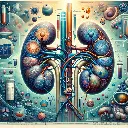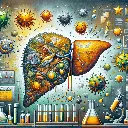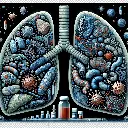
Arthritis Panel
An Arthritis Panel is a series of blood tests used to diagnose and monitor arthritis, including rheumatoid arthritis and other forms of arthritis and related conditions.

Renal Function Panel
A Renal Function Panel is a comprehensive set of blood tests designed to evaluate the health and performance of the kidneys.
Read More

Acute Hepatitis
Acute hepatitis refers to the rapid onset of liver inflammation, which can be caused by various factors, including infections(most commonly by hepatitis viruses A, B, C, D, and E), exposure to toxins, heavy alcohol use, and certain medications.

Lipid Panel
A Lipid Panel, also known as a Lipid Profile, is a blood test that measures the levels of specific fats and cholesterol in the blood, providing important information about an individual's risk of heart disease. The primary components of a lipid panel include:

Electrolyte Panel
An Electrolyte Panel is a blood test that measures the levels of key electrolytes in the blood to assess the body's chemical balance and hydration status. Electrolytes are minerals that carry an electric charge and are vital for various bodily functions, including muscle contraction, heart rhythm, and fluid balance.

Comprehensive Metabolic Panel
A Comprehensive Metabolic Panel (CMP) is an extensive blood test that provides critical information about the body's chemical balance and metabolism. This panel helps in assessing the health of various organs and systems, including the liver, kidneys, and pancreas, and aids in diagnosing conditions such as diabetes, liver disease, and kidney disease.

Hepatic function Panel
A Hepatic Function Panel, also known as a Liver Panel, is a blood test used to assess the health and performance of the liver. This panel measures various substances in the blood that are either produced by the liver or released when liver cells are damaged.

Anemia Panel
An Anemia Panel is a set of blood tests used to diagnose and determine the cause of anemia, a condition characterized by a deficiency of red blood cells or hemoglobin. This panel typically includes:

Metabolic Panel
A Metabolic Panel is a group of blood tests that measure different chemicals in the blood. It provides information about your body's chemical balance and metabolism.
Polymerase Chain Reaction (PCR) is a laboratory technique used to amplify specific DNA or RNA sequences, enabling detailed genetic analysis from minimal samples.

Pneumonia Panel
A Pneumonia Panel, often referred to as a respiratory or pneumonia pathogen panel, is a diagnostic test used to identify the organisms responsible for causing pneumonia.

Respiratory Panel
A Respiratory Panel is a comprehensive diagnostic test that identifies the specific viruses, bacteria, and sometimes fungi responsible for respiratory infections.

Wound Panel
A Wound Panel PCR test is a sophisticated diagnostic tool used to rapidly identify pathogens present in wound infections.

Fungal Panel
A fungal PCR test is a molecular diagnostic technique that detects fungal DNA in a sample, providing rapid and accurate identification of fungal pathogens.
Read More

Urinary Tract Infection (UTI) Panel
A Urinary Tract Infection (UTI) Panel typically involves a series of tests used to diagnose and monitor infections of the urinary tract. This panel might include:

SARS-COV-2
The SARS-CoV-2 PCR test is a diagnostic tool used to detect the presence of the SARS-CoV-2 virus, which causes COVID-19. This test is considered the gold standard for diagnosing COVID-19 due to its high sensitivity and specificity.

Arthritis Panel
An Arthritis Panel is a series of blood tests used to diagnose and monitor arthritis, including rheumatoid arthritis and other forms of arthritis and related conditions. Read More

Renal Function Panel
A Renal Function Panel is a comprehensive set of blood tests designed to evaluate the health and performance of the kidneys.
Read More

Acute Hepatitis
Acute hepatitis refers to the rapid onset of liver inflammation, which can be caused by various factors, including infections(most commonly by hepatitis viruses A, B, C, D, and E), exposure to toxins, heavy alcohol use, and certain medications.

Lipid Panel
A Lipid Panel, also known as a Lipid Profile, is a blood test that measures the levels of specific fats and cholesterol in the blood, providing important information about an individual's risk of heart disease. The primary components of a lipid panel include:

Electrolyte Panel
An Electrolyte Panel is a blood test that measures the levels of key electrolytes in the blood to assess the body's chemical balance and hydration status. Electrolytes are minerals that carry an electric charge and are vital for various bodily functions, including muscle contraction, heart rhythm, and fluid balance.

Comprehensive Metabolic Panel
A Comprehensive Metabolic Panel (CMP) is an extensive blood test that provides critical information about the body's chemical balance and metabolism. This panel helps in assessing the health of various organs and systems, including the liver, kidneys, and pancreas, and aids in diagnosing conditions such as diabetes, liver disease, and kidney disease.

Hepatic function Panel
A Hepatic Function Panel, also known as a Liver Panel, is a blood test used to assess the health and performance of the liver. This panel measures various substances in the blood that are either produced by the liver or released when liver cells are damaged.

Anemia Panel
An Anemia Panel is a set of blood tests used to diagnose and determine the cause of anemia, a condition characterized by a deficiency of red blood cells or hemoglobin. This panel typically includes:

Metabolic Panel
A Metabolic Panel is a group of blood tests that measure different chemicals in the blood. It provides information about your body's chemical balance and metabolism.

Pneumonia Panel
A Pneumonia Panel, often referred to as a respiratory or pneumonia pathogen panel, is a diagnostic test used to identify the organisms responsible for causing pneumonia. Pneumonia is an infection that inflames the air sacs in one or both lungs, which can be caused by a variety of pathogens, including bacteria, viruses, and fungi.

Respiratory Panel
A Respiratory Panel is a comprehensive diagnostic test that identifies the specific viruses, bacteria, and sometimes fungi responsible for respiratory infections. Utilizing advanced molecular techniques, such as polymerase chain reaction (PCR), this panel can detect a wide array of pathogens from a single sample, typically a nasal or throat swab.

Urinary Tract Infection (UTI) Panel
A Urinary Tract Infection (UTI) Panel typically involves a series of tests used to diagnose and monitor infections of the urinary tract. This panel might include:

Wound Panel
An Arthritis Panel is a series of blood tests used to diagnose and monitor arthritis, including rheumatoid arthritis and other forms of arthritis and related conditions. Read More

SARS-COV-2
Acute hepatitis refers to the rapid onset of liver inflammation, which can be caused by various factors, including infections(most commonly by hepatitis viruses A, B, C, D, and E), exposure to toxins, heavy alcohol use, and certain medications.

Fungal Panel
A Renal Function Panel is a comprehensive set of blood tests designed to evaluate the health and performance of the kidneys.
Read More
INDIVIDUAL TESTS ( Alphabetical Order )
-
Albumin
- ALT (SGPT)
- Amylase
- ANA
- AST (SGOT)
-
BNP
- Bilirubin, Total
- NT-proBNP
- C-Reactive Protein
-
Calcium
-
Carbon Dioxide Content
-
CBC With AUTO DIFF
-
Chloride, Serum
-
Cholesterol, Total
-
CEA
-
CPK
- Creatinine
-
D. Bili
-
Estradiol
-
Ferritin
-
Folic Acid
-
Free T-3
-
Free T-4
-
FSH
-
GGTP
-
Glucose
-
Hs CRP
-
HGB A1C
-
HDL, Cholesterol
-
H-Pylori
-
Hep B Core AB lgG & lgM
-
Hep B Core AB lgM
-
Hep A AB lgM
-
Hep B Surf Antigen
-
Hep B Surf AB
-
Hep C Antibody
-
Iron, Total
-
LDH
-
LDL Direct Meas.
-
Lipase
-
Magnesium
-
Phosphatase, Alkaline
-
Phosphorus
-
Potassium
-
Preg Test Serum
-
Preg Test Urine
-
Protein Total
-
PSA
-
PTH Intact
-
RA Factor
-
Sed Rate (ESR)
-
Sodium Serum
-
T3 (Total)
-
Testosterone (Total)
-
Testosterone (Free)
-
Thyroid Peroxidase AB
-
Triglyceride
-
TSH
-
Urea Nitrogen (BUN)
-
Uric Acid ( serum)
-
Urine Microalbumin
-
Vitamin B12
-
Vitamin D25 Hydroxy
-
Urinalysis

Men's Health Blood Test.
Men's health blood tests typically focus on screening for conditions and markers that are particularly relevant to men's health issues. These tests can include but are not limited to:
1. Testosterone Levels: Testosterone tests measure the levels of testosterone in the blood, which is crucial for bone density, muscle strength, sex drive, and more. Abnormal levels can indicate various health issues, including hormonal disorders, testicular tumors, and potential fertility problems.
2. Prostate-Specific Antigen (PSA): PSA tests measure the level of PSA in the blood, a protein produced by the prostate gland. Elevated levels can indicate prostate cancer, enlargement, or inflammation.
3. Lipid Profile: This test measures cholesterol levels, including total cholesterol, LDL (bad) cholesterol, HDL (good) cholesterol, and triglycerides. It's critical for assessing cardiovascular risk.
4. Blood Pressure: High blood pressure (hypertension) is a significant risk factor for heart disease and stroke. While not a blood test, regular blood pressure screenings are vital.
5. Blood Sugar Levels: Tests for blood sugar levels, including fasting blood sugar and HbA1c, are important for diagnosing and managing diabetes, a condition that affects men at a higher rate than women.
6. Liver and Kidney Function Tests: These tests assess how well the liver and kidneys are working and can detect conditions like liver disease and kidney dysfunction.
7. Complete Blood Count (CBC): A CBC can provide a broad overview of health, including detecting infections, anemia, and other hematological conditions.
8. Vitamin D Levels:Vitamin D deficiency is common and can affect bone health, immune function, and risk of chronic diseases.
These tests are not exhaustive but represent common components of a men's health assessment. It's important for individuals to consult with healthcare providers to determine which tests are appropriate based on age, lifestyle, family history, and personal health concerns. Regular health screenings and blood tests are crucial components of preventive healthcare, helping to identify risk factors and diseases in their early stages when they are most treatable.

Women's Health Blood Test
Women's health blood tests focus on screening for conditions and markers that are particularly relevant to issues commonly affecting women's health. These tests include, but are not limited to:
1. Hormone Levels: Tests for various hormones, including estrogen, progesterone, and follicle-stimulating hormone (FSH), can help evaluate menstrual cycle issues, menopause, fertility status, and hormonal imbalances.
2. Human Chorionic Gonadotropin (hCG): This hormone is tested for in pregnancy tests. Elevated levels of hCG are a sign of pregnancy and can also be used to monitor the health of the pregnancy.
3. Pap Smear: While not a blood test, the Pap smear is a critical test for women. It screens for cervical cancer and HPV, the human papillomavirus, which can cause cervical cancer.
4. Thyroid Function Tests: Women are more likely to suffer from thyroid disorders than men. Tests such as TSH (thyroid-stimulating hormone), T3, and T4 help assess thyroid health and its impact on metabolism, energy levels, and menstrual regularity.
5. Iron Levels and Complete Blood Count (CBC): Women, especially those of childbearing age, are at a higher risk of iron deficiency anemia. A CBC can help diagnose this condition by looking at hemoglobin and hematocrit levels, along with other components of the blood.
6. Lipid Profile: This test measures cholesterol levels, including total cholesterol, LDL (bad) cholesterol, HDL (good) cholesterol, and triglycerides, to assess cardiovascular risk.
7. Blood Sugar Levels: Tests for blood sugar levels, such as fasting blood sugar and HbA1c, are important for diagnosing and managing diabetes. Women with a history of gestational diabetes are at a higher risk for type 2 diabetes later in life.
8. Bone Density Screening: While not a blood test, screening for bone density is crucial for women, especially post-menopause, to assess the risk of osteoporosis.
9. Vitamin D Levels: Vitamin D is important for bone health, and deficiency can lead to a range of health issues, including an increased risk of osteoporosis.
10. Breast Cancer Markers: Certain blood markers can be elevated in women with breast cancer, though these are not typically used for screening in the general population.
These tests are part of a comprehensive approach to women's healthcare, aimed at detecting and preventing diseases early. It's important for women to discuss with healthcare providers which tests are appropriate based on their age, lifestyle, family history, and specific health concerns. Regular screenings and blood tests are key components of preventive healthcare, helping to identify risk factors and diseases at an early, more treatable stage.